Tim Atkinson's Blog, page 39
November 22, 2015
Our Father...
It's Sunday, an appropriate day of the week to wake to a headline about the Lord's Prayer. Apparently the Church of England commissioned a cinema ad (at what expense, I wonder?) that the BBFC passed and which was cleared by the Cinema Advertising Authority but that Digital Media Cinema, the body that actually places the ads in cinemas, won't allow.
The word on Twitter this morning seems to be outrage - outrage at censorship, outrage at what can be advertised in the run up to Christmas and what can't, outrage at what is seen as an affront to free speech and another example of intolerance.
But wait! Surely the rule book forbidding any religious content in cinema advertising was available for perusal before the Church in its wisdom spent £thousands (hundreds of them, probably) filming the thing? Shouldn't the outrage be directed at another example of CofE waste. There are churches with leaky roofs, not to mention hoards of the homeless and the hungry up and down the country. Is this the best use of the self-confessed impoverished church's money anyway?
They say there's no such thing as bad publicity and - true - the so-called ban has certainly got people talking this morning. But I'm not so sure. Another example (there are plenty) of the established church getting its priorities wrong isn't good for anyone's image. If I were going to church this morning is certainly think twice before putting anything in the collection.
Store up your treasures in heaven, said Jesus. I'm not sure that needs any spin or advertising. But in the meantime here, again, is a letter from His Most Reverence-ness, the Archbishop of Titipu Canterbury that I like sharing...
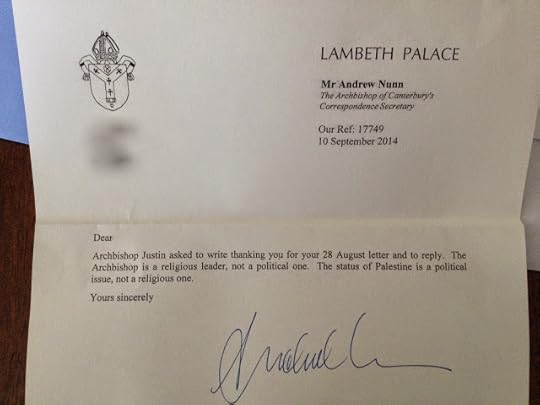
Shows they care, doesn't it?
The word on Twitter this morning seems to be outrage - outrage at censorship, outrage at what can be advertised in the run up to Christmas and what can't, outrage at what is seen as an affront to free speech and another example of intolerance.
But wait! Surely the rule book forbidding any religious content in cinema advertising was available for perusal before the Church in its wisdom spent £thousands (hundreds of them, probably) filming the thing? Shouldn't the outrage be directed at another example of CofE waste. There are churches with leaky roofs, not to mention hoards of the homeless and the hungry up and down the country. Is this the best use of the self-confessed impoverished church's money anyway?
They say there's no such thing as bad publicity and - true - the so-called ban has certainly got people talking this morning. But I'm not so sure. Another example (there are plenty) of the established church getting its priorities wrong isn't good for anyone's image. If I were going to church this morning is certainly think twice before putting anything in the collection.
Store up your treasures in heaven, said Jesus. I'm not sure that needs any spin or advertising. But in the meantime here, again, is a letter from His Most Reverence-ness, the Archbishop of Titipu Canterbury that I like sharing...

Shows they care, doesn't it?
Published on November 22, 2015 02:08
November 17, 2015
School's out!
I've just caught up with a fascinating interview on BBC Radio 3 as part of the Free Thinking Festival. Prof. Sugata Mitra thinks schools are obsolete and that teachers should be replaced by a friendly - but not necessarily knowledgeable - adult who simple asks the children questions about what they're doing, or else expresses enthusiasm and admiration for whatever they've discovered. In other words children should teach themselves, in small groups, using a computer and merely report what they're doing to a grown-up. Testing, rote learning, exams etc. are all out, cloud learning - the 'granny' cloud - is in.
As I listened I realised I had, in a small way, tried something similar many years ago. It was pre-computer, so it was based on that old-fashioned commodity, the book. At the start of each new topic or at the beginning of a new course I'd put all the books I could find on the subject in a big box and the pupils would spend a few lessons simply reading them, choosing whichever they preferred, not writing anything, just... well, reading. And, without realising it, learning.
Horrible idea! Ofsted (not to mention most Headteachers) would hate it. But the kids liked it. There were all sorts of books for them to choose from, ranging from the simplest primary school picture book to 'A' level and undergraduate texts. They could go from one to the other and back again at will. And then, when we started the course proper, they were ready. Without knowing it they'd have prepared a framework for their future learning. And enjoyed doing so.
Prof. Mitra also claims exams have outlived their usefulness. They're part of a 'just-in-case' philosophy of education that's outdated now we're able to carry 'the entire human consciousness in our pockets' (his words). It all seems so pie-in-the-sky when written down like this, yet so obvious and inevitable when explained by Professor Mitra. And he's no ivory-tower academic, either. Much of his thinking was based on an experiment he carried out in Delhi, the results of which inspired the film Slumdog Millionaire.
After more than twenty years teaching, I have a rather ambivalent approach to education. There seems little doubt that what most schools do, most of the time, is wasteful and inefficient. At worst, it leads to a fear and loathing of learning; at best, it seems no more than a means to an end. And the pressures the system heaps up on our children are enormous.
Most of what we know about the brain and how people learn has only been discovered in the last ten to fifteen years. Very little of that knowledge has filtered down to classrooms. And - like it or not - technology has changed everything. Except the underlying principles of what goes on in English school classrooms. Ideas like Prof Mitra's might just give us a tantalising glimpse of the future. Catch the interview on BBC iPlayer here while you can.
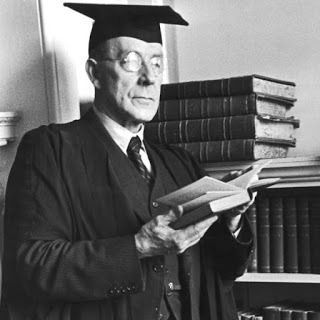
As I listened I realised I had, in a small way, tried something similar many years ago. It was pre-computer, so it was based on that old-fashioned commodity, the book. At the start of each new topic or at the beginning of a new course I'd put all the books I could find on the subject in a big box and the pupils would spend a few lessons simply reading them, choosing whichever they preferred, not writing anything, just... well, reading. And, without realising it, learning.
Horrible idea! Ofsted (not to mention most Headteachers) would hate it. But the kids liked it. There were all sorts of books for them to choose from, ranging from the simplest primary school picture book to 'A' level and undergraduate texts. They could go from one to the other and back again at will. And then, when we started the course proper, they were ready. Without knowing it they'd have prepared a framework for their future learning. And enjoyed doing so.
Prof. Mitra also claims exams have outlived their usefulness. They're part of a 'just-in-case' philosophy of education that's outdated now we're able to carry 'the entire human consciousness in our pockets' (his words). It all seems so pie-in-the-sky when written down like this, yet so obvious and inevitable when explained by Professor Mitra. And he's no ivory-tower academic, either. Much of his thinking was based on an experiment he carried out in Delhi, the results of which inspired the film Slumdog Millionaire.
After more than twenty years teaching, I have a rather ambivalent approach to education. There seems little doubt that what most schools do, most of the time, is wasteful and inefficient. At worst, it leads to a fear and loathing of learning; at best, it seems no more than a means to an end. And the pressures the system heaps up on our children are enormous.
Most of what we know about the brain and how people learn has only been discovered in the last ten to fifteen years. Very little of that knowledge has filtered down to classrooms. And - like it or not - technology has changed everything. Except the underlying principles of what goes on in English school classrooms. Ideas like Prof Mitra's might just give us a tantalising glimpse of the future. Catch the interview on BBC iPlayer here while you can.

Published on November 17, 2015 01:56
November 11, 2015
They shall grow not old
Remembrance, as we now know it, is not as straightforward as it might first appear. What would seem to us now as natural, inevitable - the individual commemoration of each fallen soldier - was in fact quite a new idea at the start of the Great War. The fact that each serviceman should have his own grave, with a stone and a name or - if his body couldn't be found - an inscription on one of the many memorials to the missing is largely thanks to the tireless work of one man, Fabian Ware, founder of what it now the Commonwealth War Graves Commission.
The bugle call that is synonymous with remembrance was, in fact, merely the last of many signals that punctuated the day in camp, ensuring soldiers got to where they were required to be on time and, in the case of The Last Post, signalled that sentries had been posted and the camp was secure for the night.
And those great words by Laurence Binyon, without which no remembrance ceremony would now be complete, were written not towards the end of the Great War when the death toll mounted, nor in 1918 when the 'intolerably nameless names' were being remembered, but in September 1914 - within weeks of the outbreak of war, and well before the scale of the slaughter was even considered a remote - and awful - possibility.
The idea for this iconic poem came to Binyon while on holiday in Cornwall. ‘The stanza They Shall Grow Not Old,' (Binyon explained when interviewed in 1939 on the eve of the outbreak of another war) 'was written first and dictated the rhythmical movement of the whole poem.’ Interesting that, by then, Binyon seems to have settled on the word order 'grow not' rather than 'not grow [old]'. Both exist in his early versions of the poem, but I've always thought 'grow not old' carries much more meaning, and is indeed why the verse still resonates so movingly today, and has become an icon of remembrance day.
With proud thanksgiving, a mother for her children,
England mourns for her dead across the sea.
Flesh of her flesh they were, spirit of her spirit,
Fallen in the cause of the free.
Solemn the drums thrill: Death august and royal
Sings sorrow up into immortal spheres.
There is music in the midst of desolation
And a glory that shines upon our tears.
They went with songs to the battle, they were young,
Straight of limb, true of eye, steady and aglow.
They were staunch to the end against odds uncounted,
They fell with their faces to the foe.
They shall grow not old, as we that are left grow old:
Age shall not weary them, nor the years condemn.
At the going down of the sun and in the morning
We will remember them.
They mingle not with their laughing comrades again;
They sit no more at familiar tables of home;
They have no lot in our labour of the day-time;
They sleep beyond England's foam.
But where our desires are and our hopes profound,
Felt as a well-spring that is hidden from sight,
To the innermost heart of their own land they are known
As the stars are known to the Night;
As the stars that shall be bright when we are dust,
Moving in marches upon the heavenly plain,
As the stars that are starry in the time of our darkness,
To the end, to the end, they remain.
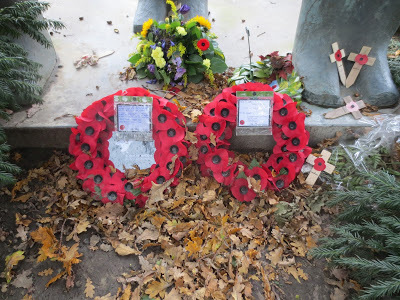
The bugle call that is synonymous with remembrance was, in fact, merely the last of many signals that punctuated the day in camp, ensuring soldiers got to where they were required to be on time and, in the case of The Last Post, signalled that sentries had been posted and the camp was secure for the night.
And those great words by Laurence Binyon, without which no remembrance ceremony would now be complete, were written not towards the end of the Great War when the death toll mounted, nor in 1918 when the 'intolerably nameless names' were being remembered, but in September 1914 - within weeks of the outbreak of war, and well before the scale of the slaughter was even considered a remote - and awful - possibility.
The idea for this iconic poem came to Binyon while on holiday in Cornwall. ‘The stanza They Shall Grow Not Old,' (Binyon explained when interviewed in 1939 on the eve of the outbreak of another war) 'was written first and dictated the rhythmical movement of the whole poem.’ Interesting that, by then, Binyon seems to have settled on the word order 'grow not' rather than 'not grow [old]'. Both exist in his early versions of the poem, but I've always thought 'grow not old' carries much more meaning, and is indeed why the verse still resonates so movingly today, and has become an icon of remembrance day.
With proud thanksgiving, a mother for her children,
England mourns for her dead across the sea.
Flesh of her flesh they were, spirit of her spirit,
Fallen in the cause of the free.
Solemn the drums thrill: Death august and royal
Sings sorrow up into immortal spheres.
There is music in the midst of desolation
And a glory that shines upon our tears.
They went with songs to the battle, they were young,
Straight of limb, true of eye, steady and aglow.
They were staunch to the end against odds uncounted,
They fell with their faces to the foe.
They shall grow not old, as we that are left grow old:
Age shall not weary them, nor the years condemn.
At the going down of the sun and in the morning
We will remember them.
They mingle not with their laughing comrades again;
They sit no more at familiar tables of home;
They have no lot in our labour of the day-time;
They sleep beyond England's foam.
But where our desires are and our hopes profound,
Felt as a well-spring that is hidden from sight,
To the innermost heart of their own land they are known
As the stars are known to the Night;
As the stars that shall be bright when we are dust,
Moving in marches upon the heavenly plain,
As the stars that are starry in the time of our darkness,
To the end, to the end, they remain.

Published on November 11, 2015 02:17
November 5, 2015
The name of the game
Another day, another reality TV show. This time, it appears, people are being asked to throw pots. (Make them, that is, rather than throw bought earthenware at the walls).
Now I like to see people bake cakes, dance, sing songs, dig allotments, create business plans and knit as much as the next man. Actually, I don't. I like to see people dance. We love Strictly in our house. But that's about all.
But what I want to know is, what's next? Because if they want an 'author-off' (or should that be 'write-off') I'm available. And I'd be pretty good at 'get the kids up, dressed and to school at the right time with the right kit and wearing the right clothes' too. And that really IS a challenge. Beats baking a cake any day.
Actually, I know what will be next. Or rather, I know how to find out. Because it's clear that the planners in telly-land have simply watched old episodes of The Generation Game and taken them apart, round by round, and made each stage into its own series.
For those unfamiliar with the concept, The Generation Game was a long-running Saturday evening TV programme hosted by Brucie ('nice to see you') Forsyth that involved family teams competing against each other after watching a series of experts demonstrating a variety of activities they themselves then had to do. Here's a typical example, involving a basket (case):
See? The expert makes it look easy! And the audience can't help laughing, anticipating the mess the contestants are likely to make of it. And, of course, they're right.
Clearly, to save money, the BBC has simply decided to recycle the idea. And maybe add some new games for good measure. I don't remember Alan Sugar ever appearing, nor the contestants having to close some ghastly business deal, but no matter. It's the formula that matters.So, in the interests of keeping the license fee low and maintaining the same cannibalistic spirit, here are a few more suggestions for reality TV programmes that I offer to the BBC (or any other broadcaster) with the proviso that, if any of them make it to screen, I get a cut.
The Apprentice... carpenter (or, 'plain-sailing with a plane')
Strictly Come Train-spotting
The only way is Esso - in which contestants compete to see whose driving is the most economical
Any Parents Kitchen Nightmare (speaks for itself)
and finally, for now,
The Great British Bog Off - in which bargain-hungry shoppers compete to save the most money while doing the weekly shop.
Didn't they do well?
Life. It's the name of the game.
Now I like to see people bake cakes, dance, sing songs, dig allotments, create business plans and knit as much as the next man. Actually, I don't. I like to see people dance. We love Strictly in our house. But that's about all.
But what I want to know is, what's next? Because if they want an 'author-off' (or should that be 'write-off') I'm available. And I'd be pretty good at 'get the kids up, dressed and to school at the right time with the right kit and wearing the right clothes' too. And that really IS a challenge. Beats baking a cake any day.
Actually, I know what will be next. Or rather, I know how to find out. Because it's clear that the planners in telly-land have simply watched old episodes of The Generation Game and taken them apart, round by round, and made each stage into its own series.
For those unfamiliar with the concept, The Generation Game was a long-running Saturday evening TV programme hosted by Brucie ('nice to see you') Forsyth that involved family teams competing against each other after watching a series of experts demonstrating a variety of activities they themselves then had to do. Here's a typical example, involving a basket (case):
See? The expert makes it look easy! And the audience can't help laughing, anticipating the mess the contestants are likely to make of it. And, of course, they're right.
Clearly, to save money, the BBC has simply decided to recycle the idea. And maybe add some new games for good measure. I don't remember Alan Sugar ever appearing, nor the contestants having to close some ghastly business deal, but no matter. It's the formula that matters.So, in the interests of keeping the license fee low and maintaining the same cannibalistic spirit, here are a few more suggestions for reality TV programmes that I offer to the BBC (or any other broadcaster) with the proviso that, if any of them make it to screen, I get a cut.
The Apprentice... carpenter (or, 'plain-sailing with a plane')
Strictly Come Train-spotting
The only way is Esso - in which contestants compete to see whose driving is the most economical
Any Parents Kitchen Nightmare (speaks for itself)
and finally, for now,
The Great British Bog Off - in which bargain-hungry shoppers compete to save the most money while doing the weekly shop.
Didn't they do well?
Life. It's the name of the game.
Published on November 05, 2015 05:13
November 2, 2015
Getting the goat...
The lovely people at St Helen's Farm have sent us a hamper brim full of goat's milk and goat's milk products - including cheese and yoghurt and butter and, of course, milk in manifold variations (skimmed, semi-skimmed and so on).
I hadn't realised until I did a little online research that they're based at Seaton Ross in East Yorkshire. I used to have a Saturday job there, many - many - moons ago. At Seaton Ross, that is. It had nothing to do with goats. It involved pheasants. I was a bush-beater. Sounds alarming, I agree. And in a way, it is. My defence is it was all a long, long time ago.
Anyway, St Helen's Farm is a goat farm and dairy set in more than 500 acres in the Vale of York. It was established in 1998 to cater for people with an intolerance of cow's milk, a function it still fulfils.
This short film will tell you a little about the history of the farm and how they look after their goats and make the fresh milk, butter, yogurt and cheese that are distributed to supermarkets throughout the UK every day.
In the meantime, we're doing the most delicious taste test.
I hadn't realised until I did a little online research that they're based at Seaton Ross in East Yorkshire. I used to have a Saturday job there, many - many - moons ago. At Seaton Ross, that is. It had nothing to do with goats. It involved pheasants. I was a bush-beater. Sounds alarming, I agree. And in a way, it is. My defence is it was all a long, long time ago.
Anyway, St Helen's Farm is a goat farm and dairy set in more than 500 acres in the Vale of York. It was established in 1998 to cater for people with an intolerance of cow's milk, a function it still fulfils.
This short film will tell you a little about the history of the farm and how they look after their goats and make the fresh milk, butter, yogurt and cheese that are distributed to supermarkets throughout the UK every day.
In the meantime, we're doing the most delicious taste test.
Published on November 02, 2015 11:21
October 31, 2015
Is this the real life?
It was forty (not twenty) years ago today. And it wasn't the band being taught to play (by Sgt Pepper or anyone else, for that matter) but the single most original piece of pop ever recorded being released on an unsuspecting public. Yes, Queen's Bohemian Rhapsody is forty years old. Today.
It's a classic, of course. It's also outrageously high camp, humorous and hugely entertaining. So, in honour of its rather inauspicious birth (or release) here it is, and here's to the next forty years.
Bismillah!
It's a classic, of course. It's also outrageously high camp, humorous and hugely entertaining. So, in honour of its rather inauspicious birth (or release) here it is, and here's to the next forty years.
Bismillah!
Published on October 31, 2015 09:00
October 29, 2015
Cheers... or, Op uw gezondheid! (as they say in Belgium)
An email arrives with the ultimate in offers-I-can't-refuse. Would you like to review our beer?
Well, I suppose, if you insist...
Stella Artois (for it is they) is a full-flavoured premium lager with a hoppy aroma and a hint of fruitiness. It has been brewed in Leuven, Belgium since the mid-1920s but the history of Stella Artois begins with a brewery called Den Horen that dates back to 1366. In 1717, master brewer Sebastian Artois purchased the brewery and changed its name to Artois. Stella Artois was first introduced as a Christmas beer ('stella' is Latin for star) in 1926.
Now at this point my interest quickened. Because, my new book 'Known unto God' is set in Belgium during the aftermath of World War One and focusses on the lives of a small group of Tommies given the grisly duty of clearing the battlefields and burying bodies. Thirsty work, of course. And the characters all quench their thirsts (with Belgian beer) at every opportunity. (They certainly had the money - British soldiers who volunteered for such unpopular duties were paid an extra 2/6 a day.)
Here's a short extract:
Françoise pouts and flaps the tea towel she is holding at the counter. The bar is quiet. Jack turns and squints through his tobacco smoke at the yellowing, varnished posters - cracked and blistered with age - that cover gaps in the walls where panels of the corrugated iron have been joined together. Music hall acts, he assumes. For long-expired performances.
‘You don’t hate them, do you?’ Françoise asks at last. ‘You don’t hate the Germans, not like we do.’
‘Why should I hate them?’
‘You should hate them for what they did,’ she says. ‘For who they are. For what they will become.’
Jack pushes back his cap and scratches his head. ‘I can’t… I don’t hate anybody.’
‘But they would have killed you, Jacques! They killed your friends. These men you dig up every day and bury…’
‘It were war, lass.’ Even though it is all that Jack can think to say, he knows it’s not much of an answer.
Françoise stops, hands by her side, and looks at him. But she isn’t smiling. ‘Was it was war when our women and children were raped and killed in 1914? Was it war when the Germans shot unarmed men simply because they were Belgians in their own country, living their lives peacefully as they had always wanted to?’
‘Aye, well...’
But she is angry now and in no mood for ‘aye, well’ anymore. Jack turns away. Again the tattered music hall bills catch his eye. He wonders why he’s never noticed them before. And alongside the gay variety notices there are others - a picture of a plump, apron-wearing artisan holding a brimming mug of Vermeulen beer in front of the ruined campanile - demandez les Bieres de la Brasseries… Vraagt de Bieren der Brouwerij, the slogan reads. Jack brings the mug he’s holding to his lips.
‘Maybe it was ‘war’ to you,’ Françoise is saying, watching him, watching his eyes over the rim of his tankard.
Remember Belgium - Enlist Today! Another slogan. And below the call to action is a smart Tommy standing to attention. Remember Scarborough! That is the recruiting poster Jack sees when he shuts his eyes. He remembers the bombardment, too - remembers the ripple of fear that had spread through the village at the thought that the Germans were poised for an invasion. Here, that fear was a reality. No wonder they - no wonder she - feels such hostility. He can see it clearly in the figure of a blond-haired girl being dragged away by a thick set, square-jawed, Pickelhauber-ed Hun and in the angry fires of the burning Belgian city whose red flames turn the figures into silhouettes.
‘You had a gun,’ she says following his gaze. ‘But what about the poor civilians of Andanne and Seilles, Tamines and Dinant?’
‘Aye, well…’ He sighs.
‘Aye well, you say. Aye well, aye well. It is easy for you to say. That is all you ever say - aye, well. Well I will tell you something. On August 25th 1914 at Louvain, the German army set fire to the town, destroying the medieval library and all its ancient books, killing hundreds of innocent people and forcing thousands - almost the whole population of the town - to leave their homes. And for what? There were no franc-tireurs there. It was a seat of learning, a place of art and culture and the Germans looted and destroyed it all.’
‘Franc - what, love?’
‘Franc-tireurs. Those suspected of resisting the enemy.’
‘And did they?’
‘Did they what?’ she asks, tears now welling in her dark eyes.
‘Did they resist the enemy?’
She looks at him. A cold, hard look. A mixture of hostility and guilt. ‘What do you think?’ she replies.
Ypres, at the time, was little more than a cross between a building site and a refugee camp. Comforts were few and far between but the beer was flowing and some of the first buildings to be constructed on the ruins of the city were estaminets - cafes, bars, brasseries - where both locals and Allied troops could relax and eat and drink. Not that they'd have been drinking Stella. Not for a few more years, at any rate.
So they'd have missed out on that deliciously hoppy aroma with a hint of fruitiness and clean bitterness balanced with the malt flavour - the high quality 'assured through a superior brewing process and by using the finest ingredients available.'
But I'm not. I'm raising a glass (and a rather nice Stella Chalice it is, too) to the men who served their King and Country first with a rifle, then with a shovel.
They deserve it.
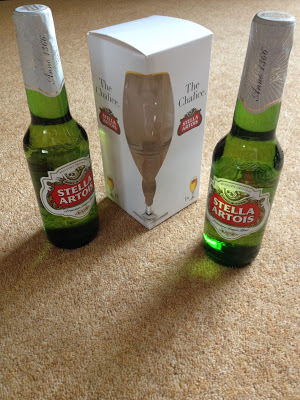
Cheers! Or as Jack might have said, Op uw gezondheid!
Well, I suppose, if you insist...
Stella Artois (for it is they) is a full-flavoured premium lager with a hoppy aroma and a hint of fruitiness. It has been brewed in Leuven, Belgium since the mid-1920s but the history of Stella Artois begins with a brewery called Den Horen that dates back to 1366. In 1717, master brewer Sebastian Artois purchased the brewery and changed its name to Artois. Stella Artois was first introduced as a Christmas beer ('stella' is Latin for star) in 1926.
Now at this point my interest quickened. Because, my new book 'Known unto God' is set in Belgium during the aftermath of World War One and focusses on the lives of a small group of Tommies given the grisly duty of clearing the battlefields and burying bodies. Thirsty work, of course. And the characters all quench their thirsts (with Belgian beer) at every opportunity. (They certainly had the money - British soldiers who volunteered for such unpopular duties were paid an extra 2/6 a day.)
Here's a short extract:
Françoise pouts and flaps the tea towel she is holding at the counter. The bar is quiet. Jack turns and squints through his tobacco smoke at the yellowing, varnished posters - cracked and blistered with age - that cover gaps in the walls where panels of the corrugated iron have been joined together. Music hall acts, he assumes. For long-expired performances.
‘You don’t hate them, do you?’ Françoise asks at last. ‘You don’t hate the Germans, not like we do.’
‘Why should I hate them?’
‘You should hate them for what they did,’ she says. ‘For who they are. For what they will become.’
Jack pushes back his cap and scratches his head. ‘I can’t… I don’t hate anybody.’
‘But they would have killed you, Jacques! They killed your friends. These men you dig up every day and bury…’
‘It were war, lass.’ Even though it is all that Jack can think to say, he knows it’s not much of an answer.
Françoise stops, hands by her side, and looks at him. But she isn’t smiling. ‘Was it was war when our women and children were raped and killed in 1914? Was it war when the Germans shot unarmed men simply because they were Belgians in their own country, living their lives peacefully as they had always wanted to?’
‘Aye, well...’
But she is angry now and in no mood for ‘aye, well’ anymore. Jack turns away. Again the tattered music hall bills catch his eye. He wonders why he’s never noticed them before. And alongside the gay variety notices there are others - a picture of a plump, apron-wearing artisan holding a brimming mug of Vermeulen beer in front of the ruined campanile - demandez les Bieres de la Brasseries… Vraagt de Bieren der Brouwerij, the slogan reads. Jack brings the mug he’s holding to his lips.
‘Maybe it was ‘war’ to you,’ Françoise is saying, watching him, watching his eyes over the rim of his tankard.
Remember Belgium - Enlist Today! Another slogan. And below the call to action is a smart Tommy standing to attention. Remember Scarborough! That is the recruiting poster Jack sees when he shuts his eyes. He remembers the bombardment, too - remembers the ripple of fear that had spread through the village at the thought that the Germans were poised for an invasion. Here, that fear was a reality. No wonder they - no wonder she - feels such hostility. He can see it clearly in the figure of a blond-haired girl being dragged away by a thick set, square-jawed, Pickelhauber-ed Hun and in the angry fires of the burning Belgian city whose red flames turn the figures into silhouettes.
‘You had a gun,’ she says following his gaze. ‘But what about the poor civilians of Andanne and Seilles, Tamines and Dinant?’
‘Aye, well…’ He sighs.
‘Aye well, you say. Aye well, aye well. It is easy for you to say. That is all you ever say - aye, well. Well I will tell you something. On August 25th 1914 at Louvain, the German army set fire to the town, destroying the medieval library and all its ancient books, killing hundreds of innocent people and forcing thousands - almost the whole population of the town - to leave their homes. And for what? There were no franc-tireurs there. It was a seat of learning, a place of art and culture and the Germans looted and destroyed it all.’
‘Franc - what, love?’
‘Franc-tireurs. Those suspected of resisting the enemy.’
‘And did they?’
‘Did they what?’ she asks, tears now welling in her dark eyes.
‘Did they resist the enemy?’
She looks at him. A cold, hard look. A mixture of hostility and guilt. ‘What do you think?’ she replies.
Ypres, at the time, was little more than a cross between a building site and a refugee camp. Comforts were few and far between but the beer was flowing and some of the first buildings to be constructed on the ruins of the city were estaminets - cafes, bars, brasseries - where both locals and Allied troops could relax and eat and drink. Not that they'd have been drinking Stella. Not for a few more years, at any rate.
So they'd have missed out on that deliciously hoppy aroma with a hint of fruitiness and clean bitterness balanced with the malt flavour - the high quality 'assured through a superior brewing process and by using the finest ingredients available.'
But I'm not. I'm raising a glass (and a rather nice Stella Chalice it is, too) to the men who served their King and Country first with a rifle, then with a shovel.
They deserve it.

Cheers! Or as Jack might have said, Op uw gezondheid!
Published on October 29, 2015 06:25
October 22, 2015
Horrid Henry Giveaway!
Fans of the Horrid Henry books and BAFTA nominated TV series, will be thrilled to hear that a delightfully horrid new app, Horrid Henry’s Big Box of Pranks, is now available on iOS and Android devices for £2.99. The app is a collection of fun, fast and funny action-packed mini-games based on Henry’s love for all things mischievous! Visit www.p2games.co.uk for more information
To celebrate, P2 are offering a fantastic prize bundle containing the new Horrid Henry ‘s Big Box of Pranks app, a Horrid Henry Costume and a copy of the Horrid Henry It’s All Your Fault DVD.

To enter, simply leave a 'pick me' comment, tweet a link to this post, like my Facebook page, do my laundry and ironing and/or share on any other social media platform (before next Wednesday, October 28th) and... it could be you.
Don't let it be them. Especially not him.
To celebrate, P2 are offering a fantastic prize bundle containing the new Horrid Henry ‘s Big Box of Pranks app, a Horrid Henry Costume and a copy of the Horrid Henry It’s All Your Fault DVD.

To enter, simply leave a 'pick me' comment, tweet a link to this post, like my Facebook page, do my laundry and ironing and/or share on any other social media platform (before next Wednesday, October 28th) and... it could be you.
Don't let it be them. Especially not him.
Published on October 22, 2015 01:07
October 20, 2015
Dad's the way!
A new study by the Institute of Public Policy Research has found that there are now two million maternal breadwinners in Britain (a rise of ten percent since 1996). That translates as roughly one third of households where mum earn most (or, indeed, all) of the household income.
Speaking as someone for whom that has been true for the past seven years I can only say I'm delighted to be at the cutting end of the trend. Although the finances are a bit tight! (Anyone want to buy a book?)
But at the same time we learn that only 60 per cent of dads take their full entitlement of paternity leave. And although in April this year the rules changed allowing parents to share the full 50 week parental leave entitlement, as little as 2 per cent of companies are currently reporting men making requests to take all or part of this allowance.
Of course, the pay is undoubtedly a factor. Many employers won't either be willing or able to enhance the basic statutory pay of just £140 per week, in spite of the fact that many do so as far as maternity leave is concerned. Maybe future legislation should level this particular playing field for a start.
But I'm still rather baffled by the suggestion that some men feel 'emasculated' by giving up work and looking after children. Their own children.
In my experience as a stay-at-home dad I've often found attitudes to what I do changing (pretty swiftly) from a general 'I-don't-know-how-you-do-it' to a wistful, 'I-wish-I-could/had'. That's immensely sad. Kids grow up too quickly as it is. We should try to make the most of the precious moments that we have.
A job's just a job. But a dad is forever.
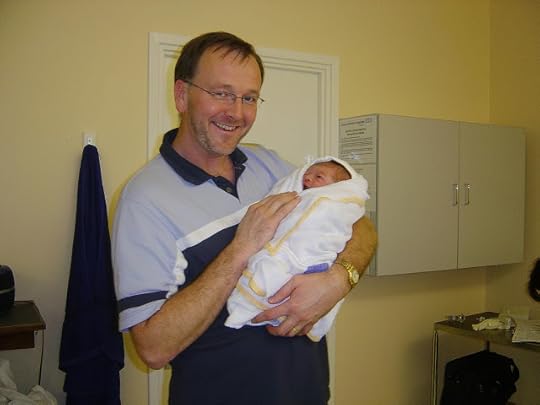
Speaking as someone for whom that has been true for the past seven years I can only say I'm delighted to be at the cutting end of the trend. Although the finances are a bit tight! (Anyone want to buy a book?)
But at the same time we learn that only 60 per cent of dads take their full entitlement of paternity leave. And although in April this year the rules changed allowing parents to share the full 50 week parental leave entitlement, as little as 2 per cent of companies are currently reporting men making requests to take all or part of this allowance.
Of course, the pay is undoubtedly a factor. Many employers won't either be willing or able to enhance the basic statutory pay of just £140 per week, in spite of the fact that many do so as far as maternity leave is concerned. Maybe future legislation should level this particular playing field for a start.
But I'm still rather baffled by the suggestion that some men feel 'emasculated' by giving up work and looking after children. Their own children.
In my experience as a stay-at-home dad I've often found attitudes to what I do changing (pretty swiftly) from a general 'I-don't-know-how-you-do-it' to a wistful, 'I-wish-I-could/had'. That's immensely sad. Kids grow up too quickly as it is. We should try to make the most of the precious moments that we have.
A job's just a job. But a dad is forever.

Published on October 20, 2015 04:41
October 14, 2015
1066 and all that...
The French like to think they did it, of course. But they didn't. The Normans weren't French; far from it. They were Normans, of course - Norsemen - who (like their Viking kin who had settled in the north of England) had tired of raiding and decided to settle down. On someone else's land. In the case of the Norman's, French land which the French king willingly gave to them to keep them quiet.
Anyway, having got that little bit of history out of the way let's put to bed that other great Battle of Hastings myth, shall we? You know the one. The arrow in the eye. Harold - poor chap - looking up at just the wrong moment and - whiiiish - argggh!
Harold Godwinson (for it was he) was probably the most unlucky king in English history (as well as one of the shortest serving). Because, you see, it wasn't only William, Duke of Normandy, who was after de-throning the Earl of Wessex (that's Harold, btw) but another Harald (with two 'a's) from Norway - Harald Hardrada who thought he'd quite like to be King of England, too.
So the last, great Viking army sailed up the Humber and landed at Stamford Bridge in Yorkshire. Where they were annihilated by Harold (HarOld) and his English army. And that was that. The end of the Viking age. Hundreds of years of raiding, pillaging an worse ended at a stroke by the bloke who a few days later had to march down to the south coast to meet the Conqueror.
Except he wasn't. Yet. And he nearly wasn't ever. As William jumped down from his ship he fell - face full of sand, the lot. The Norman army looking on thought this was a very bad omen and they were nearly proved right. Quite early in the Battle of Hastings the English Housecarls with their huge battle axes had the upper hand, literally hacking down Norman mounted knights - horse and rider - in a single blow.
But then Harold would look up, wouldn't he? Maybe it was that perennial English need to check on the weather, who knows. And I know I said it was a bit of a myth, but it seems Harold did get one in the eye. Just that it didn't do for him, as we all assume.
No, according to the Bayeux Tapestry Harold was then cut down by a Norman knight. Obviously didn't see him coming. And that was the end of the Battle of Hastings. Which took place 949 years ago today.
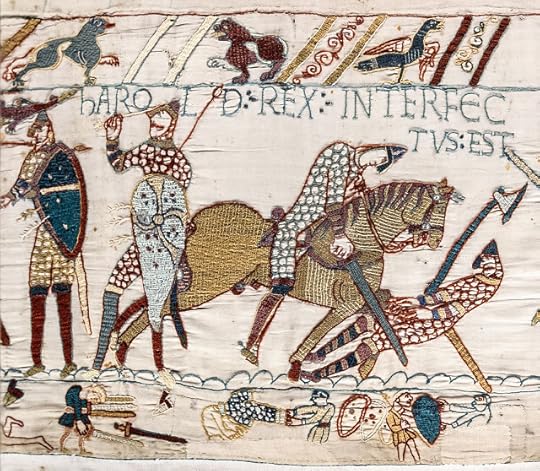
Anyway, having got that little bit of history out of the way let's put to bed that other great Battle of Hastings myth, shall we? You know the one. The arrow in the eye. Harold - poor chap - looking up at just the wrong moment and - whiiiish - argggh!
Harold Godwinson (for it was he) was probably the most unlucky king in English history (as well as one of the shortest serving). Because, you see, it wasn't only William, Duke of Normandy, who was after de-throning the Earl of Wessex (that's Harold, btw) but another Harald (with two 'a's) from Norway - Harald Hardrada who thought he'd quite like to be King of England, too.
So the last, great Viking army sailed up the Humber and landed at Stamford Bridge in Yorkshire. Where they were annihilated by Harold (HarOld) and his English army. And that was that. The end of the Viking age. Hundreds of years of raiding, pillaging an worse ended at a stroke by the bloke who a few days later had to march down to the south coast to meet the Conqueror.
Except he wasn't. Yet. And he nearly wasn't ever. As William jumped down from his ship he fell - face full of sand, the lot. The Norman army looking on thought this was a very bad omen and they were nearly proved right. Quite early in the Battle of Hastings the English Housecarls with their huge battle axes had the upper hand, literally hacking down Norman mounted knights - horse and rider - in a single blow.
But then Harold would look up, wouldn't he? Maybe it was that perennial English need to check on the weather, who knows. And I know I said it was a bit of a myth, but it seems Harold did get one in the eye. Just that it didn't do for him, as we all assume.
No, according to the Bayeux Tapestry Harold was then cut down by a Norman knight. Obviously didn't see him coming. And that was the end of the Battle of Hastings. Which took place 949 years ago today.

Published on October 14, 2015 10:26



